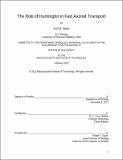The role of Huntingtin in fast axonal transport
Author(s)
Weiss, Kurt R
DownloadFull printable version (4.029Mb)
Alternative title
Role of Huntingtin protein in fast axonal transport
Other Contributors
Massachusetts Institute of Technology. Dept. of Biology.
Advisor
J. Troy Littleton.
Terms of use
Metadata
Show full item recordAbstract
Huntington's Disease (HD) is an autosomal dominant, neurodegenerative disease that occurs when an expansion of the polyQ tract of the huntingtin gene expands to greater than ~35 residues. This mutation leads to aggregation of the Huntingtin protein (Htt) and degeneration of striatal and cortex neurons, ultimately causing motor impairment and personality changes. Neither the mechanism by which mutant Htt causes toxicity, nor the endogenous function of wild-type Htt, are well understood. To explore mechanisms of mutant Htt-induced toxicity, we generated and characterized a Drosophila model of HD by expressing a 588 amino acid N-terminal fragment of human Htt with 138 glutamines, and tagged with mRFP (Q138Htt-RFP). We used this model to conduct a screen for genes that modify cytoplasmic aggregation and/or toxicity phenotypes. We identified two classes of interacting suppressors in our screen: those that rescue viability while decreasing Htt expression and aggregation, and those that rescue viability independent of effects on Htt aggregation, suggesting that aggregation and toxicity can be separated. To evaluate the putative function of Htt in fast axonal transport, we characterized the co-localization of the Drosophila Htt homolog tagged with mRFP (dHtt-RFP), and the alterations in axonal transport kinetics associated with a dhtt null. We find that dHtt co-localizes with a subset of cargos including synaptic vesicles and mitochondria, and acts locally on these cargos to increase transport processivity. Finally, we evaluated the effects of Q138Htt-RFP expression on transport kinetics. We find that the majority of transport cargos bypass Q138Htt aggregates, indicating they are not complete blockages of axonal transport. We also observe reduced mitochondrial transport in the absence of aggregates, suggesting aggregate-independent transport defects. Our observations of transport in vivo support a role for wild-type Htt in mediating fast axonal transport of membrane bound organelles, and suggest that mutant Htt can cause aggregation-dependent and -independent defects in axonal transport.
Description
Thesis (Ph. D.)--Massachusetts Institute of Technology, Dept. of Biology, 2012. This electronic version was submitted by the student author. The certified thesis is available in the Institute Archives and Special Collections. Cataloged from student-submitted PDF version of thesis. Includes bibliographical references.
Date issued
2012Department
Massachusetts Institute of Technology. Department of BiologyPublisher
Massachusetts Institute of Technology
Keywords
Biology.